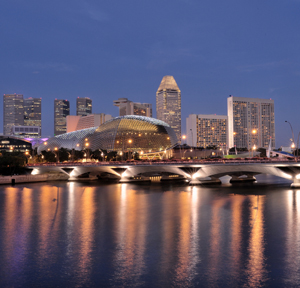Banking Crisis
Singapore Can't Afford To Lift Property, Leverage Curbs Just Yet - MAS

It is premature to ease curbs on Singapore’s real estate market despite recent price declines as risks of high debt leverage remain, the head of the city-state’s financial regulator has warned.
It is premature to ease curbs on Singapore’s real estate market despite recent price declines as risks of high debt leverage remain, the head of the city-state’s financial regulator has warned.
The private property price index has moderated by cumulative 3.3 per cent over the last three quarters, but it is far too early for the Monetary Authority of Singapore to remove or ease controls such as caps on loan-to-value ratios and stamp duty taxes, Ravi Menon, the MAS managing director, has said.
As a sign that the jurisdiction faces some headwinds, banks such as DBS have cut gross domestic growth forecasts on Singapore recently in the wake of some poor data (see here). The risk that high property prices and ultra-low interest rates could tempt people into unwise debt exposure, particularly if the economy stalls, continues to worry authorities.
Menon's warnings are not confined to Singapore. In the UK, for example - where London prime property prices have surged in recent years, the Bank of England has warned of the associated risks.
To some degree, property measures have worked – but more time is needed, Menon said when speaking about the MAS annual report for 2013/14. There is also evidence, from International Monetary Fund-directed stress tests on banks last year, that the sector is more resilient to shocks such as a stock market plunge or slump in real estate prices.
Menon noted that year-on-year growth of household debt has moderated from nearly 13 per cent in the third quarter of 2011 to 5.5 per cent in the first quarter of 2014. The risk profile of new housing loan borrowers has improved over this period.
But risks linger: “Property prices remain at elevated levels. Prices went up 60 per cent over last four years but have declined by just 3.3 per cent over the last three quarters. Global interest rates are still at historical lows. Relaxing property measures in the current easy liquidity environment may set off another spiral of price increases.”
“The level of debt among highly leveraged households remains high. For these highly leveraged households, reducing the level of leverage will take time. They need to work with their banks and commit to debt repayment plans,” he continued.
“Hence on the whole, MAS’ assessment is that it is premature to ease property cooling measures now. It is important that we secure the gains we have made in stabilising the market and restoring financial prudence,” he said.
On a separate topic, Menon noted that the size of the city-state’s financial sector grew rapidly over the past financial year period. Financial and insurance services grew by 10.8 per cent last year. In asset management, total AuM grew by almost 12 per cent to reach S$1.82 trillion in 2013.
The MAS itself recorded an overall profit of S$15.8 billion for the financial year of 2013/14. In the previous year, it logged a loss of S$10.6 billion, although foreign exchange swings considerably influence results, Menon said.